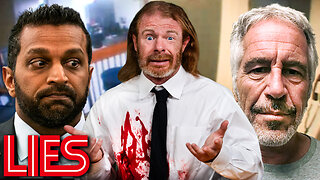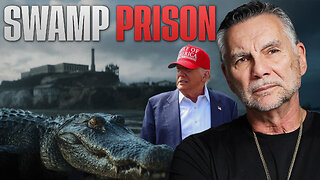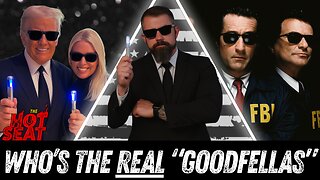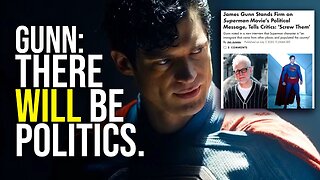Premium Only Content

"The Coming Race", Chapter XXVI, by Edward Bulwer-Lytton
In which the author conveniently summarizes everything for us, and reveals to us his true attitude towards it all. How handy.
As to some of the ideas expressed herein, bear in mind this was published in 1871. Some of it might well sound like it could come right out of Nazi propaganda (the Great Aryan family or violent opposition to race mixing), but this was 50 years before the Nazis ever came along. All the ideas that would coalesce into Nazism after WWI had been floating around for at least several decades prior, most of it being rooted in various formally stated 19th century propositions, often with much deeper roots than that. As awful as it was, Nazism didn't just spring out of nowhere fully formed in 1920, it was a culmination of many things that had been percolating about western and central Europe for a very long time. And here in this story, we see a couple hints of such things coming from a British author.
Washington: George Washington, first president of the USA.
Jackson: there are several notable people of the name "Jackson" in US history, but I am going to assume here he means president Andrew Jackson. Although most people today don't view him so favorably, but perhaps 150 years ago he might have enjoyed a better reputation.
Sheridan: this one is a lot less obvious, and I can only go with Philip Sheridan, a US army general, a close associate of Grant, and an important general of the Union army during the Civil War. Not nearly as well known today, but I'm sure people in the 1860s were plenty familiar with him.
Webster: Noah Webster, of dictionary fame, but also a big advocate for creating a unique US identify separate from the British. Hence his dictionaries included a lot of alternate spellings, dropping the 'u' from colour and honour and the like, and changing 's' to 'z' in various words, etc. Don't like how US and British spellings vary so subtlety as they do? Blame Webster :-P
Sumner: I really don't know who this is a reference to, not even given the context of the other names listed along with it. Perhaps Charles Sumner, an important abolitionist prior to the Civil War?
Wendell Holmes: Another one hard to pin down. It is unlikely to be the famous Supreme Court Justice as in 1871 he was only just a few years into his law practice and wouldn't be appointed to any judge-ship until 1882. So, we have to go with his father, Oliver Wendell Holmes, Sr., a notable poet and physician.
Butler: Given how extremely common this family name is, I can't even begin to guess which Butler he had in mind here. If you have a thought on which early to mid-18th century American of this name might fit the bill, leave a comment below.
Interesting that Abraham Lincoln doesn't make any of his lists of important Americans of the 19th century...
The picture used is a portrait of Robert Owen (1834) by William Henry Brooke. We saw the name Robert Owen used in the previous chapter, he was a utopian socialist.
To follow along: https://www.gutenberg.org/files/1951/1951-h/1951-h.htm#link2HCH0026
As far as the author wanting to critique utopian socialists, the story is now effectively over. There are, however, still a couple of short chapters left to complete the narrator's story arc.
-
 57:28
57:28
Redacted News
1 hour agoHe's EXPOSING the Secret Dark History of The W.H.O and the Pandemic Treaty | Redacted Conversation
6.42K8 -
 DVR
DVR
vivafrei
7 hours agoEpstein Fallout Continues! Terrorists Welcomed in Canada? Zohran Mamdani Failing Up? AND MORE!
115K28 -
 LIVE
LIVE
StoneMountain64
3 hours agoREMATCH is PEAK gaming in 2025
671 watching -
 LIVE
LIVE
Sarah Westall
42 minutes agoEpstein, Palantir, Thin Thread - Intel Ops w/ NSA Whistleblower Bill Binney & Dr. Katherine Horton
388 watching -
 LIVE
LIVE
Futures Edge: Finance Unfiltered with Jim Iuorio and Bob Iaccino
58 minutes agoLIVE Global Macro & The Lie About Tariffs
233 watching -
 LIVE
LIVE
LFA TV
19 hours agoLFA TV ALL DAY STREAM - TUESDAY 7/8/25
1,644 watching -
 1:20:06
1:20:06
Awaken With JP
4 hours agoThere's No List, & You Should Just Shut Up - LIES Ep 99
33.2K66 -
 39:39
39:39
Michael Franzese
2 hours agoIs Alligator Alcatraz Really That Bad? My Honest Take
22.6K10 -
 LIVE
LIVE
The HotSeat
1 hour agoYou Can’t Flashy-Thing Us! The Epstein Cover-Up STINKS — And the FBI’s the Real Criminal Empire!
1,031 watching -
 22:58
22:58
Clownfish TV
10 hours agoSuperman WILL Be Political, Says James Gunn.
4.68K6